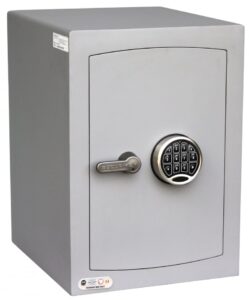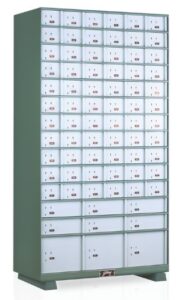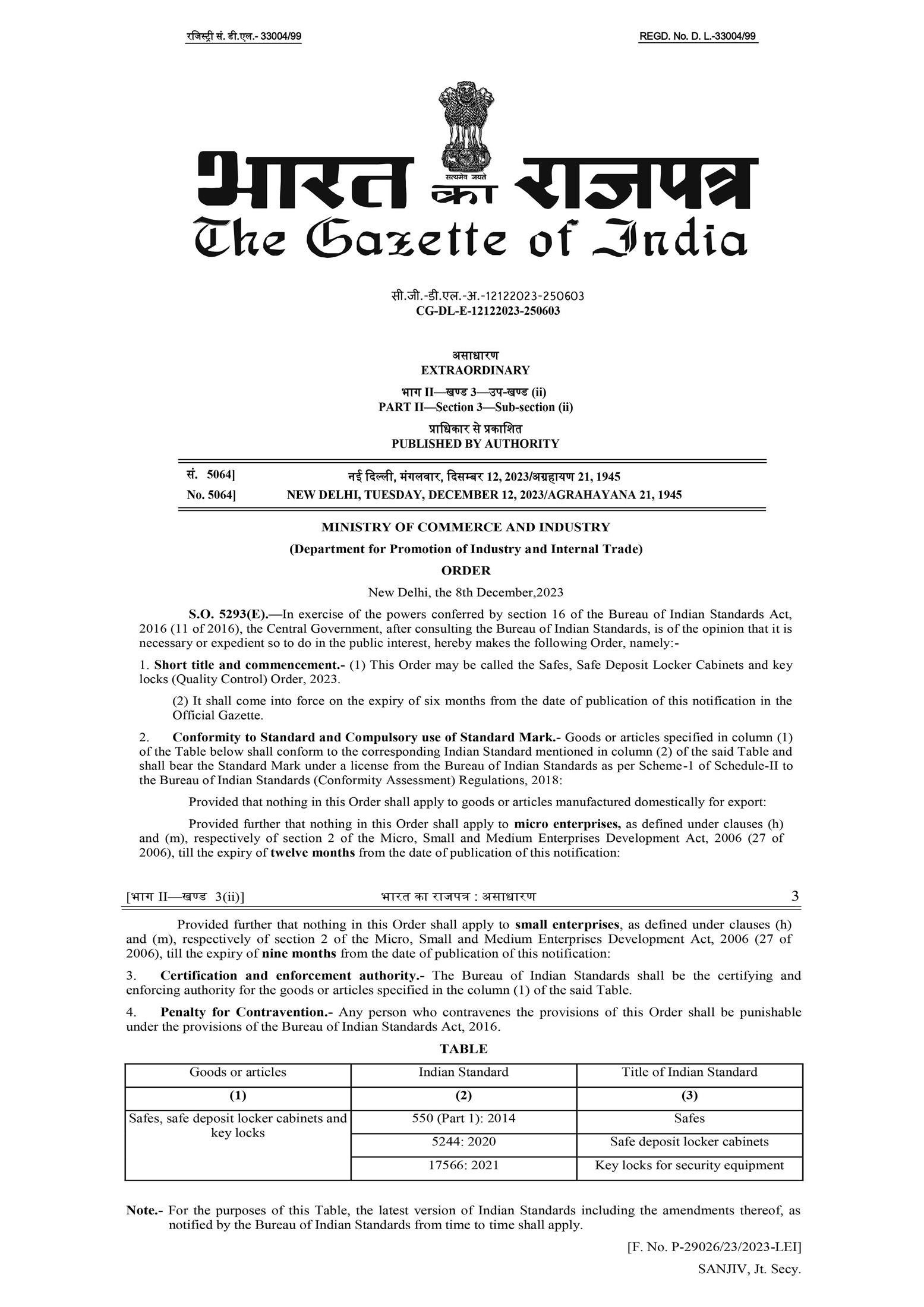BIS CERTIFICATION OF SAFE, SAFE DEPOSIT LOCKER CABINETS AND KEY LOCKS FOR SECURITY EQUIPMENT AS PER IS 550 (PART 1):2022, 5244:2020 AND IS 17566:2021
INTRODUCTION
The security of personal belongings and valuables is a paramount concern for individuals and businesses alike. In ensuring the safety of these items, the use of safe deposit locker cabinets and key locks meeting stringent standards is imperative. The Bureau of Indian Standards (BIS) plays a pivotal role in certifying such security equipment, ensuring adherence to national standards such as IS 550 (Part 1) for safe deposit locker cabinets, IS 5244 for key locks, and IS 17566 for security equipment.
INDIAN STANDARDS
IS 550 (PART 1):2022 SAFES
 This standard specifies the dimensions, general requirements and performance criteria for safes. Safe shall generally be designated by its classification code and size/actual size. The body shall be manufactured in multi-bend construction. The body shall be made so as to provide rebate on all four sides. The construction of body shall be such that the resultant force of pull on the door is resisted by a member that is either an integral part of the body or is welded to the inner part of the body and not by any component part that is screwed or riveted. The recesses for the sliding bolts may be individual or continuous slot. Anchoring arrangement, if required by the purchaser, shall be suitably provided. Door shall be made of mild steel plates, backed with suitable barrier(s) to meet the performance requirements as per the class. Hinges shall be of pivot type. They shall be so designed as to allow free movement of the door without friction or play. An arrangement to facilitate oiling of hinges shall be provided. The bolt work shall be mounted on a secure base, such as door slab. The door sides through which the bolts slide shall be minimum 5 mm thick and solidly welded to the doorplate. Key Locks or Mechanical Combination Locks shall be provided. An automatic relocking device one for each key lock shall be fitted in the door which being always on guard, shall come into operation if a lock is dislodged by explosives or other means. Cross hatch test shall be conducted to conform the adhesion of coating.
This standard specifies the dimensions, general requirements and performance criteria for safes. Safe shall generally be designated by its classification code and size/actual size. The body shall be manufactured in multi-bend construction. The body shall be made so as to provide rebate on all four sides. The construction of body shall be such that the resultant force of pull on the door is resisted by a member that is either an integral part of the body or is welded to the inner part of the body and not by any component part that is screwed or riveted. The recesses for the sliding bolts may be individual or continuous slot. Anchoring arrangement, if required by the purchaser, shall be suitably provided. Door shall be made of mild steel plates, backed with suitable barrier(s) to meet the performance requirements as per the class. Hinges shall be of pivot type. They shall be so designed as to allow free movement of the door without friction or play. An arrangement to facilitate oiling of hinges shall be provided. The bolt work shall be mounted on a secure base, such as door slab. The door sides through which the bolts slide shall be minimum 5 mm thick and solidly welded to the doorplate. Key Locks or Mechanical Combination Locks shall be provided. An automatic relocking device one for each key lock shall be fitted in the door which being always on guard, shall come into operation if a lock is dislodged by explosives or other means. Cross hatch test shall be conducted to conform the adhesion of coating.
IS 5244:2020 SAFE DEPOSIT LOCKER CABINETS
 This standard specifies the general requirements of materials and details of construction of safe deposit locker cabinets which afford security to precious articles, documents or any item that needs to be protected from unauthorized access. Safe deposit locker cabinets shall preferably be of the following types: a) Type 1 — Containing 75 lockers, b) Type 1A — Containing 90 lockers, c) Type 2 — Containing 52 lockers, d) Type 2A — Containing 51 lockers, e) Type 3 — Containing 32 lockers, and f) Type 4 — Any other configuration. The construction of safe deposit locker cabinet shall be such that it provides maximum security to the lessee. Lockers shall be secured with unpick able dual control key-lock. Lockers shall be self locking so that the custodian does not have to re-lock the locker with his (custodian’s) key after the lessee has locked it. The mechanism of the lock shall be such that the lessee shall not be able to withdraw his key unless the lock has been re-locked fully. Once the lessee has locked the locker, the same cannot be opened unless the custodian turns in his key to take off his control number. No key of one lock shall apply to any other lock except its own. The lessee’s as well as the custodian’s keys shall be made of stainless steel or any other metal/alloy having non-corrosive properties. The locker unit shall be tested for its performance against burglarious attacks with common hand tools. The locker unit shall be able to successfully withstand such attack for a period of not lsess than 15 min. The test shall meet following conditions: a) Screwdrivers (dia ≤ 12mm, length ≤ 200 mm including handle), spanners, pliers (length ≤ 160 mm), chisels (dia ≤ 12mm, length ≤ 150 mm), punches, prying tools (total weight ≤ 0.5 kg, length ≤ 200 mm) and crowbars (dia ≤ 12mm , length ≤ 200 mm including handle) may be used for the test.
This standard specifies the general requirements of materials and details of construction of safe deposit locker cabinets which afford security to precious articles, documents or any item that needs to be protected from unauthorized access. Safe deposit locker cabinets shall preferably be of the following types: a) Type 1 — Containing 75 lockers, b) Type 1A — Containing 90 lockers, c) Type 2 — Containing 52 lockers, d) Type 2A — Containing 51 lockers, e) Type 3 — Containing 32 lockers, and f) Type 4 — Any other configuration. The construction of safe deposit locker cabinet shall be such that it provides maximum security to the lessee. Lockers shall be secured with unpick able dual control key-lock. Lockers shall be self locking so that the custodian does not have to re-lock the locker with his (custodian’s) key after the lessee has locked it. The mechanism of the lock shall be such that the lessee shall not be able to withdraw his key unless the lock has been re-locked fully. Once the lessee has locked the locker, the same cannot be opened unless the custodian turns in his key to take off his control number. No key of one lock shall apply to any other lock except its own. The lessee’s as well as the custodian’s keys shall be made of stainless steel or any other metal/alloy having non-corrosive properties. The locker unit shall be tested for its performance against burglarious attacks with common hand tools. The locker unit shall be able to successfully withstand such attack for a period of not lsess than 15 min. The test shall meet following conditions: a) Screwdrivers (dia ≤ 12mm, length ≤ 200 mm including handle), spanners, pliers (length ≤ 160 mm), chisels (dia ≤ 12mm, length ≤ 150 mm), punches, prying tools (total weight ≤ 0.5 kg, length ≤ 200 mm) and crowbars (dia ≤ 12mm , length ≤ 200 mm including handle) may be used for the test.
IS 17566:2021 KEY LOCKS FOR SECURITY EQUIPMENT
This standard specifies the general requirements and performance criteria for key locks for security equipment like but not limited to safes, strong room doors, safe deposit locker cabinets, etc. Requirements of lever lock, two key lock and cylindrical locks have been prescribed. The lock shall be constructed so that it will operate only when the intended key or keys are used. The product shall be constructed for installation in a position or location such that it does not reduce the burglary/fire resistant qualities of the security product on which it is being used. For lock with sliding bolt, throw of the bolt shall be minimum 7 mm from unlocked to locked position. For locks with rotational bolt movement, rotation of the bolt shall be minimum 90 degrees from unlocked to locked position. For Lever Type Lock Minimum thickness of lever shall not be less than 1.2 mm nominal. False (dummy) levers shall not be used. Difference between gate of the lever and thickness of bolt stump in the direction perpendicular to bolt movement shall not be more than 1.0 mm. The lock should not open by using a key having only one key cut different from the actual Key of that lock. Similarly, lock should not open with one depth difference of the design in lever, tumblers, or pin. All parts of the lock shall be constructed of brass, bronze, zinc base alloy, stainless steel or corrosion resistant materials or steel with protective finish. All parts of the lock shall be able to comply with the salt spray corrosion test. Endurance Test, Bolt Forcing Test, Salt Spray Corrosion Test, Key Strength are some of the performance tests specified for locks.
QUALITY CONTROL ORDER (TECHNICAL REGULATION) ISSUED BY THE DEPARTMENT FOR PROMOTION OF INDUSTRY AND INTERNAL TRADE, MINISTRY OF COMMERCE AND INDUSTRY, GOVT. OF INDIA ON 08 DECEMBER 2023 FOR MANDATORY BIS CERTIFICATION
The DPIIT, Ministry of Commerce & Industry, Govt. of India, has issued an order, making it mandatory for all fasteners to be used in India, whether manufactured in India or imported from foreign countries, shall mandatorily carry the Standard Mark of the Bureau of Indian Standards under a valid BIS licence. In short, it has become obligatory for all the manufacturers of fasteners, wherein in India or overseas, to immediately apply for BIS licence and obtain a valid BIS certification licence before that the last date of implementation of the order, i.e., 07 June 2024.
 BIS CERTIFICATION AT A GLANCE
BIS CERTIFICATION AT A GLANCE
BIS certification serves as a mark of quality and compliance, assuring consumers and businesses alike of the reliability and safety of the certified products. Under these standards, safe deposit locker cabinets are rigorously tested for durability, resistance to tampering, and fire protection, while key locks are evaluated for strength, precision, and resistance to unauthorized access. Manufacturers seeking BIS certification must undergo thorough testing and inspection processes to ensure their products meet these exacting standards.
OMEGA QMS PVT. LTD. AT YOUR DOORSTEP
Omega QMS Pvt. Ltd. plays a crucial role in facilitating the BIS certification process for manufacturers of security equipment. As a leading regulatory compliance consultancy firm, Omega QMS provides comprehensive support to manufacturers in navigating the complexities of certification requirements. Their expertise encompasses documentation assistance, quality audits, testing coordination, and compliance management, streamlining the certification journey for manufacturers and ensuring efficient adherence to BIS standards. With Omega QMS’s guidance, manufacturers can expedite the certification process, enhance product credibility, and gain a competitive edge in the market.
CONCLUSION
In conclusion, BIS certification serves as a hallmark of quality and safety for safe deposit locker cabinets, key locks, and other security equipment. Adherence to standards such as IS 550 (Part 1), IS 5244, and IS 17566 ensures that these products meet stringent criteria for reliability, durability, and resistance to unauthorized access. With the support of organizations like Omega QMS Pvt. Ltd., manufacturers can navigate the certification process with ease, bolstering consumer confidence and advancing the integrity of security equipment in the market.
 For your Certification needs pls contact info@globalomega.com 011-41413939(100 lines)
For your Certification needs pls contact info@globalomega.com 011-41413939(100 lines)
908-909, Hemkunt House, Rajendra Place, New Delhi-110008, India

Leave a Reply